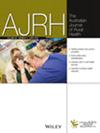Rural Food Forward: An Appetite for Change
Abstract
Aims
This paper explores the pervasive influence of Commercial Determinants of Health (CDoH), particularly the proliferation of ultra-processed foods (UPFs), on rural diets, and introduces the concept of Commercial Determinants of Rural Health (CDoRH) to highlight the unique challenges faced by rural Australian communities. In response, we propose a framework for simple, low-cost, and adaptable initiatives aimed at improving rural food environments and dietary behaviours.
Context
Rural populations experience a disproportionately high burden of non-communicable diseases (NCDs), with poor diet and the widespread availability of UPFs as major contributing factors. The impacts of CDoH, amplified by centralised supply chains and limited market competition, are particularly acute in rural settings. As poor diet remains the most significant modifiable risk factor for NCDs, the need for targeted rural interventions is urgent.
Approach
The proposed model leverages the potential of small-scale, low-cost initiatives that harness social capital and local resources. These initiatives aim to transform local rural food environments and dietary habits through place-based, collaborative, educative, and practical activities such as community gardens, food events, and local partnerships.
Conclusion
This model intervenes in the space between large-scale systemic reform and the everyday food choices of individuals and communities. By fostering quick, accessible, and contextually grounded initiatives, it offers a practical framework for improving local food environments and behaviours, enhancing food literacy, and mitigating the harms of CDoRH in ways that resonate with rural lived experience.


 求助内容:
求助内容: 应助结果提醒方式:
应助结果提醒方式:


